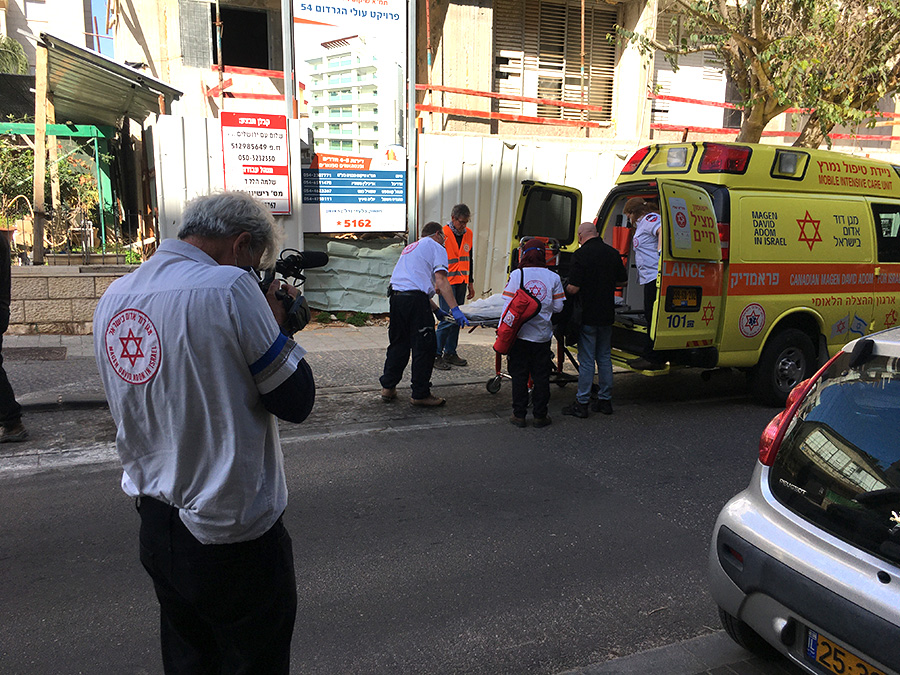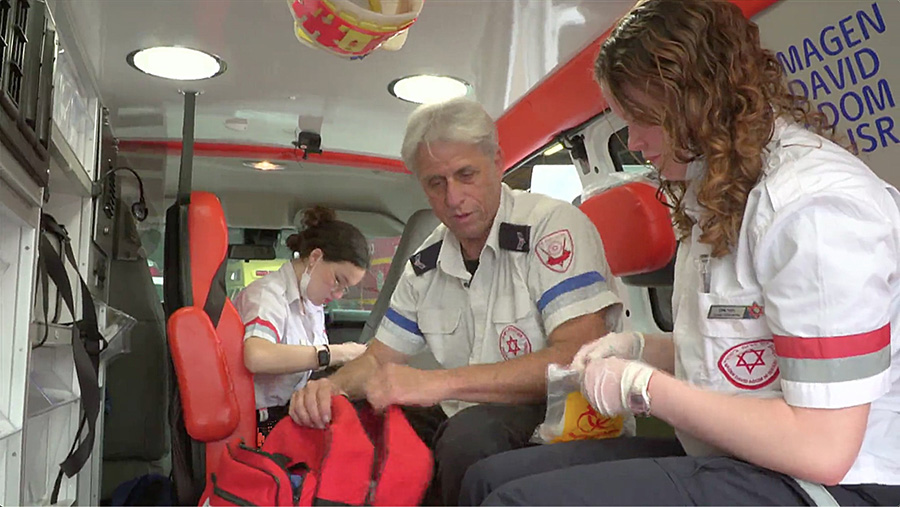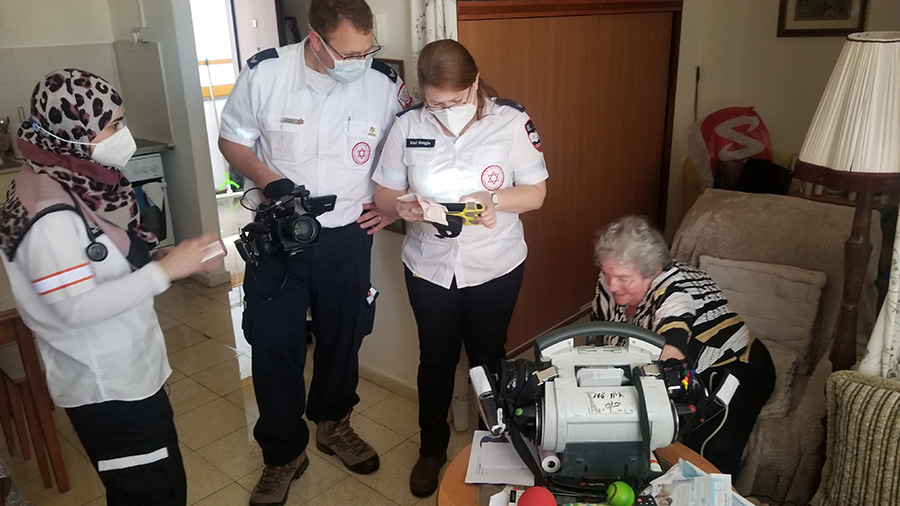Tel Aviv 911: New Documentary Explores the Diversity and Challenges of Israel’s Volunteer EMS Service

Areen Kabaha is a Muslim woman working alongside her Jewish colleagues as an MDA volunteer paramedic — an example of the diversity the job entails. In the documentary, Kabaha notes that she also holds a masters in art therapy and helps some of her colleagues deal with the stress and trauma of the job, while also hosting a gathering at her home each month to allow volunteers of all backgrounds to come together. Photo: Courtesy of Martin Himel/VisionTV
Imagine a medical emergency — anything from a heart attack to a building collapse to a terror attack — and the first responders on the scene aren’t professional paramedics, but volunteers ranging in age from 17 to 70. They’ve been alerted by a state-of-the-art app — kind of like the Bat signal, but for non-caped crusaders — that allows any such volunteer in the area to be on the scene and begin lifesaving procedures precious minutes before the paramedics arrive.
It sounds like a strange concept to many in North America but, in Israel, it’s the norm. And it saves lives. The country’s Magen David Adom (MDA) EMS service consists of 25,000 paramedics who are aided by a larger contingent of 29,000 volunteer first responders. If any of the volunteers are in an area where a medical emergency takes place, they get an app notification and can be on the scene almost immediately — saving precious minutes in a life-or-death situation before the paramedics arrive.
The concept is unique to MDA and one that’s explored in the new one-hour documentary, Tel Aviv 911, which premieres on VisionTV (a ZoomerMedia property) on Monday, May 16 at 9p.m. EST.
Directed by filmmaker Martin Himel, 66, who is also a 21-year MDA volunteer senior medic, the film offers a fascinating, intimate and first-hand account of the emergency scenarios these volunteers rush into on a daily basis. The group of volunteers is a diverse one — high school students paired with people in their 60s and 70s, or Jewish and Muslim colleagues sharing an ambulance — and their work, while rewarding, takes an emotional toll.
Ahead of the film’s premiere, Himel spoke with Zoomer via email to discuss the documentary, why so many people in their 60s and 70s volunteer with MDA and why he thinks the system could work well in North America.

MIKE CRISOLAGO: Why do you think so many people in their 60s and 70s volunteer to work with MDA rather than participating in less stressful vocations — or, as 72-year-old Abba put it in the film, spending their retirement at the beach?
MARTIN HIMEL: MDA is not for everybody precisely because of the stress and responsibility factor. But there are many levels of volunteering. I have a commanding position in the ambulance over the team. Others prefer to be team members with less responsibility but a lot of giving. Many professionals of Zoomer age are drawn to this type of “challenge and giving” because they are, by nature, people who seek meaningful challenges and are searching for new horizons in their lives in addition to their careers. There are plenty of other reasons as well. Orthodox Jews and observant Muslims and Christians find giving to the sick and ill and those in need from injury as a natural extension of their faith.
MC: At this point in your tenure as an MDA volunteer, what do you enjoy most about the job?
MH: It is helping others in physical need at a tough time in their lives. No one wakes up and plans to go to the hospital emergency ward that day … So whether it is young or old, serious injury or a bad sprain, helping them and easing their concern gives me a profound sense of giving. It’s not a matter of thanks. I do not expect that or a pat on the back. It is just the act of giving — not being paid for it — that makes it a special and wonderful experience.

MC: Some viewers may be surprised to hear that people in their 60s and 70s volunteer with MDA in responding to emergencies. What advantages does being over 60 offer someone volunteering with MDA in that capacity?
MH: We have a sense of maturity and also not a young person’s need to perform that makes us more empathetic to people in need. Tender loving care (TLC) is a big part of being a medic or paramedic. The sense of the “unknown” for the patient — ‘What is wrong with me?’ — is acute, and mature empathy goes a long way in helping.
MC: What lessons have you learned from working with your younger colleagues — especially those who may still be in their teens?
MH: What I have especially learned is [the] North American perception of raising children has some major flaws. “Helicopter parenting,” driving children everywhere, shielding them from the world in [their] teens hinders and does not help teens grow. In MDA, teens are screened and trained to help out with very serious cases including heart attacks, strokes, car accidents, etc. They are not traumatized or frightened by the responsibility. They rise up to the challenge. They feel better about themselves. It makes them want to take on more meaningful challenges in the future. We should be giving our teens much more responsibility and a feeling [that] we believe in their capabilities to handle such challenges.
MC: The MDA provides such a wonderful example of volunteers who transcend any perceived conflicts or barriers when it comes to age or faith to work together for the common good. What do you think the rest of us can learn from their example in that regard?
MH: When we volunteer in anything that provides a sense of humanity and compassion for others, it brings out the best of us. If we bring diverse communities and peoples together to share in a challenge that provides good and care for others, those ethnic barriers disappear for a while and unusual friendships and bonds develop.

MC: You note in the documentary that the idea of volunteers assisting with EMS calls may not be something that appeals to people in North America. Given your experience, do you think it’s a system that could benefit us here, and why?
MH: I believe it could greatly benefit North Americans for all the reasons above. But we have to overcome some hurdles. First of all, volunteers in EMS are completely protected from litigation and lawsuits in Israel. That is a must here as well. And secondly, people would have to get used to the idea that a loved one could be having a heart attack at home and everybody could be in a very vulnerable position and then a stranger knocks at your door with CPR experience and says they can help. It could be just a basic first responder that had their EMS app on and raced to the scene. A complete stranger not in a uniform, not a doctor is hard to accept here, especially in a life-threatening situation. But it can make the difference between life and death. CPR within a minute or two of an occurrence can save your loved one. Every minute later it becomes more impossible.
Tel Aviv 911 premieres on VisionTV (a ZoomerMedia property) on Monday, May 16 at 9pm ET.
This interview has been edited and condensed.
RELATED:
Recent Study Says That Volunteering Boosts Health and Well-Being
New Documentary Radical Age Explores the Unconventional Side of Getting Older